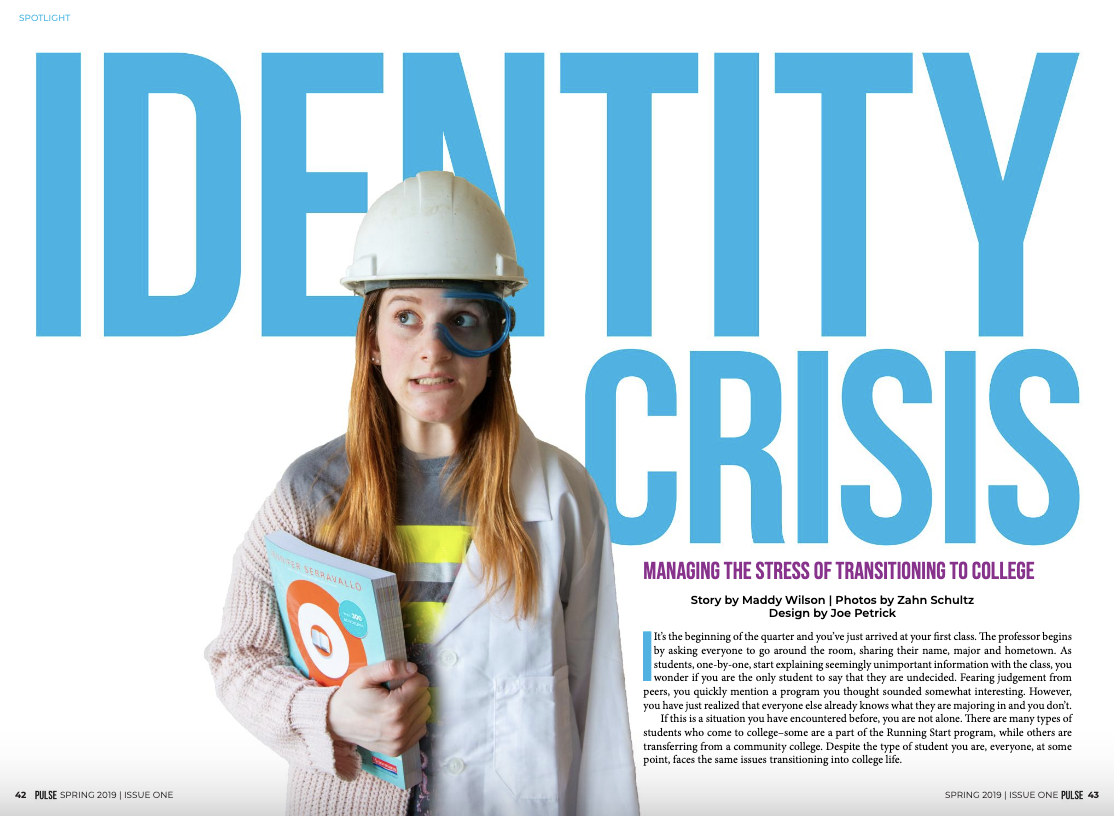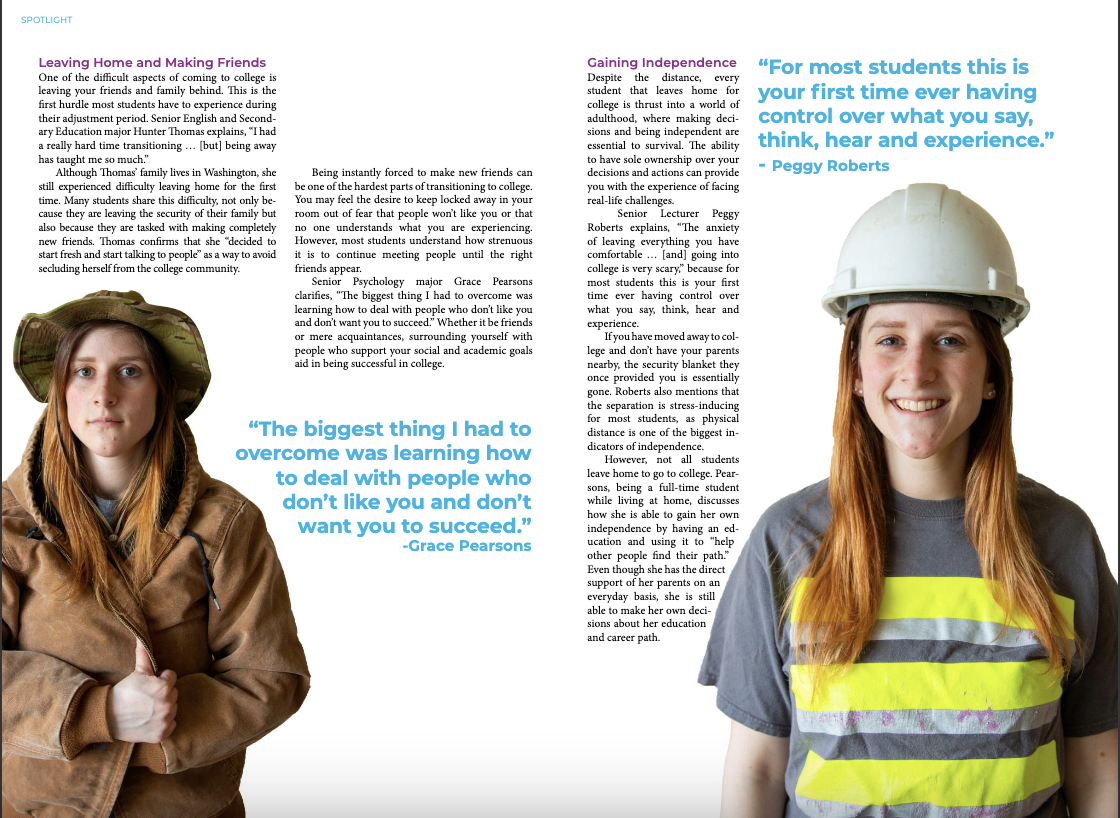Identity Crisis: Managing the Stress of Transitioning to College
Story by Madeline Wilson | Photos by Zahn Schultz | Design by Joe Patrick
It’s the beginning of the quarter and you’ve just arrived at your first class. The professor begins by asking everyone to go around the room, sharing their name, major and hometown. As students, one-by-one, start explaining seemingly unimportant information with the class, you wonder if you are the only student to say that they are undecided. Fearing judgement from peers, you quickly mention a program you thought sounded somewhat interesting. However, you have just realized that everyone else already knows what they are majoring in and you don’t.
If this is a situation you have encountered before, you are not alone. There are many types of students who come to college--some are a part of the Running Start program, while others are transferring from a community college. Despite the type of student you are, everyone, at some point, faces the same issues transitioning into college life.
Leaving Home and Making Friends
One of the difficult aspects of coming to college is leaving your friends and family behind. This is the first hurdle most students have to experience during their adjustment period. Senior English and Secondary Education major Hunter Thomas explains, “I had a really hard time transitioning … [but] being away has taught me so much.”Although Thomas’ family lives in Washington, she still experienced difficulty leaving home for the first time. Many students share this difficulty, not only because they are leaving the security of their family but also because they are tasked with making completely new friends. Thomas confirms that she “decided to start fresh and start talking to people” as a way to avoid secluding herself from the college community.
Being instantly forced to make new friends can be one of the hardest parts of transitioning to college. You may feel the desire to keep locked away in your room out of fear that people won’t like you or that no one understands what you are experiencing. However, most students understand how strenuous it is to continue meeting people until the right friends appear. Senior Psychology major Grace Pearsons clarifies, “The biggest thing I had to overcome was learning how to deal with people who don’t like you and don’t want you to succeed.” Whether it be friends or mere acquaintances, surrounding yourself with people who support your social and academic goals aid in being successful in college.
Gaining Independence
Despite the distance, every student that leaves home for college is thrust into a world of adulthood, where making decisions and being independent are essential to survival. The ability to have sole ownership over your decisions and actions can provide you with the experience of facing real-life challenges. Senior Lecturer Peggy Roberts explains,
“The anxiety of leaving everything you have comfortable … [and] going into college is very scary,”
because for most students this is your first time ever having control over what you say, think, hear and experience. If you have moved away to college and don’t have your parents nearby, the security blanket they once provided you is essentially gone. Roberts also mentions that the separation is stress-inducing for most students, as physical distance is one of the biggest indicators of independence. However, not all students leave home to go to college. Pearsons, being a full-time student while living at home, discusses how she is able to gain her own independence by having an education and using it to “help other people find their path.” Even though she has the direct support of her parents on an everyday basis, she is still able to make her own decisions about her education and career path.
What Are Your Options?
When starting college, Pearsons was a part of the Running Start program. Because of this, she understands that students who continue into higher education while still living at home face other issues associated with balancing their family life and the independence of college. Angelia Riveria, associate director of Running Start, explains,
“Having so many choices can be stressful for [students],”
and is one of the biggest struggles Running Start students face in particular. However, making academic decisions for yourself is a stressor that most college students face.
Have you ever considered switching your major? Once, twice, maybe even three times? There are many students like yourself who have had doubts about which career-path is right for them. Thomas understands this feeling and says, “when I moved to college, I went through a whole identity crisis.” Some students feel lost finding themselves and their passions in a sea of other students. Oppositely, maybe your parents had intentions of you becoming a doctor or lawyer when your sights were set on studying accounting. Or, are you simply having difficulty finding the best major to fit your interests and passions?
Despite the reason, most students face doubts about what they want to study. “I felt really lost in life for a while. I had no idea what I was doing [and] I wanted to drop out because I just didn’t think college was for me," says Thomas. "I was just taking all the wrong classes and that was making me so unhappy.” Sometimes, being strategic about the classes you choose to take can make or break your college experience. You may have already completed your general education requirements but still have no clue what you want to study. Most students, including Pearsons, will switch majors more than once. Although currently a psychology major, Pearsons began as a Running Start student studying pre-medicine and eventually switched to theatre once she had obtained her associate degree.
She explains that one of the difficult aspects of switching from pre-medicine to theatre was dealing with outside opinions on her decision. “I was receiving a lot of judgement for being a theatre major, and then there was a time where I knew that I was leaving the theatre department, but I didn’t know which major I was going to,” she says. One pressure you may be facing while trying to decide on a major is asking if it will direct you toward your intended career, or if you want your major and career to coincide. Riveria digresses that there is
“this expectation that there’s going to be a job waiting on the other side, when the reality is there’s a whole lot of other stuff to getting a really good job besides just having your degree.”
Like many other students, you may be worried that if you don’t decide on the perfect degree that you won’t be able to get the job you want. However, choosing to be a biology major does not automatically send you on a path to medicine; it is your experience and drive that will set you apart from others in your field.
The Ups and Downs
In order to navigate college life, you need to find the best de-stressing methods that work for you. Some students prefer to exercise, while others enjoy watching moves; being able to recognize your favorite self-care activities and actively practicing them is essential to surviving college. Thomas notes, “I’m really into oils; some days I don’t think I could get through the day without oils." Using essential oils relaxes her, she says, and helps her manage stress. Likewise, Senior Graphic Design major Kash Serock concludes that spending time with her cat is one of the best ways for her to de-stress. If you feel that the overwhelming pressure of finding friends and feeling comfortable in college is stopping you from achieving your goals, take a second to breathe and take time to figure out what is right for you.



